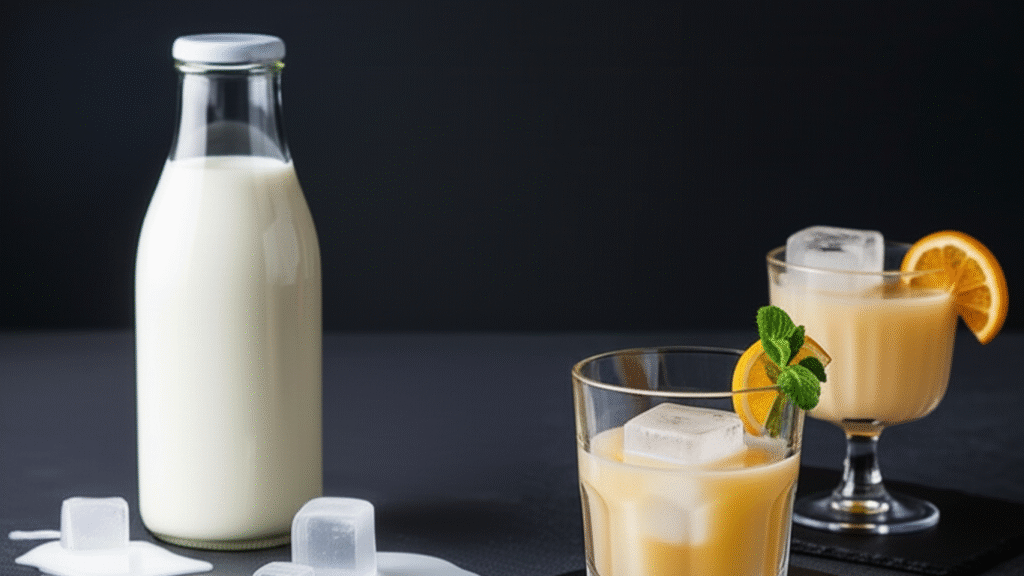
Can You Mix Milk and Alcohol?
Combining milk and alcohol might seem strange, but it’s actually common in some beverages like the White Russian or Irish Cream. However, many people question the milk and alcohol reaction, especially when it comes to health, digestion, and hangovers.
Let’s explore what happens scientifically when you combine alcohol and milk.
What Happens When You Mix Milk With Alcohol?
When alcohol is mixed with milk, no harmful chemical reaction occurs. However, alcohol is a diuretic and irritant, while milk is dense and slow to digest. This means that the milk and alcohol reaction can feel uncomfortable for some, particularly in the stomach.
Key facts:
- Alcohol can cause gastric irritation, and combining it with dairy (especially full-fat milk) may increase the feeling of bloating or nausea in sensitive individuals.
- The fat and protein in milk may slightly slow alcohol absorption in the stomach, but the effect is minor and not medically significant for preventing intoxication or hangovers.
Is It Bad to Drink Milk After Alcohol?
Drinking milk after alcohol is not inherently bad or dangerous. For most people, milk after alcohol can be soothing, especially if alcohol has caused stomach discomfort.
However:
- If you’re lactose intolerant or have IBS, dairy products may worsen digestive symptoms after drinking.
- Alcohol can impair digestion, so combining it with a heavy, creamy liquid like milk may cause nausea or discomfort in some individuals.
So, is it bad to drink milk after alcohol? Not usually—but it depends on your digestive health.
Does Drinking Milk Before Alcohol Help?
Some people believe drinking milk before alcohol helps “coat the stomach” and prevent intoxication or hangovers. There is no scientific evidence that milk prevents intoxication or liver damage.
However:
- A light meal or something with fat (like milk) can slow gastric emptying, delaying alcohol absorption slightly.
- This doesn’t prevent a hangover or protect your liver—it simply slows the process of alcohol reaching the bloodstream.
So yes, milk might help reduce the immediate impact of alcohol, but it doesn’t eliminate the effects.
Are Milk and Alcohol Dangerous Together?
There’s no dangerous chemical reaction between milk and alcohol. But the combination may cause discomfort, especially if you drink large quantities or have lactose sensitivity.
So when people say “milk and alcohol are bad together,” they’re usually referring to the digestive side effects—not any toxic interaction.
Should You Avoid Dairy and Alcohol Together?
Not necessarily. Many cocktails use dairy or cream successfully. But you should avoid mixing milk and alcohol if:
- You have lactose intolerance or digestive disorders
- You’ve had a large amount of alcohol, making digestion slower
- You’re prone to nausea or acid reflux, both of which alcohol can worsen
In those cases, it’s fair to say that milk and alcohol is bad for you.
Conclusion: Is Milk and Alcohol Safe?
✅ Safe for most people in moderation
✅ Used in many cocktails
⚠️ May cause discomfort if overconsumed or if you have digestive issues
Ultimately, the decision depends on your body. There’s no danger in combining milk and alcohol occasionally, but listen to your gut—literally.
For more science-backed advice on health, digestion, and lifestyle, visit Search Your Fitness—your guide to better living.
More Blogs That You Should Read
- Can You Drink Milk After Pepsi or Coke?
- Top 6 Incredible Health Advantages of Apple Cider Vinegar
- Is Alcohol and Milk Safe to Drink Together?
References for Fact-Checking Milk and Alcohol Reactions:
- U.S. National Library of Medicine – Alcohol’s Effects on the Body
- National Institute of Diabetes and Digestive and Kidney Diseases – Lactose Intolerance and Alcohol Effects
YOUR NEEDS 😉
Click any tool below to explore and calculate instantly!


